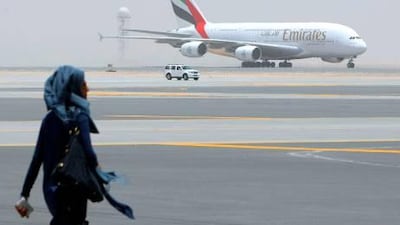Emirates Airline is on course to achieve a double record this year, racking up US$2 billion (Dh7.34bn) in profits and carrying 30 million passengers after registering a dramatic improvement in its first-half performance.
The airline quadrupled its first-half profits to Dh3.4bn between March and September by controlling costs and enjoying record passenger demand, as the global economy recovered. The airline, which last year became the world's biggest by international traffic, also handled 15.5 million passengers, a record for the period.
Sheikh Ahmed bin Saeed Al Maktoum, the chairman and chief executive of Emirates, said the airline benefited from the return of business and first-class travel, as well as its strategy of deploying new aircraft to routes serving the world's growing economies.
"Flexibility affords us the option of increasing passenger and cargo services on high-demand sectors," said Sheikh Ahmed. "By following these positive spikes in regional economies we have been able to maximise the use of our fleet to further stimulate revenue."
Emirates operates a fleet of more than 150 wide-bodied aircraft to more than 100 destinations. Although the airline expanded its capacity significantly in the past year after receiving new aircraft from Airbus and Boeing, the extra space was exceeded by the rise in passenger demand, contributing to load factors, or seat occupancy rates, of 81.2 per cent - Emirates's highest first-half figures yet.
The results will help to justify the airline's aggressive capacity growth, with an additional 62 wide-bodied aircraft ordered in the first six months of this year alone.
The profits come as airlines around the world enjoy a return to profitability. The International Air Transport Association (IATA) predicts industry-wide profits of $8.9bn this year, three times higher than the $2.5bn it forecast in June.
In the US, airlines are having their most profitable period since 1978, with United, Continental and Delta collectively earning more than $1bn in the third quarter. In the UK, British Airways posted a mid-year profit of £158 million (Dh931.5m), its first profits since 2008.
"While Emirates is a special case in terms of its figures, its performance nevertheless acts as an indicator for the state of the broader air transport industry," said David Kaminski-Morrow, an editor with Air Transport Intelligence in the UK. "The figures, including the better take-up in the premium cabin, reflect a more confident economy."
But Mr Kaminski-Morrow warned airlines would be concerned about the climbing price of fuel. According to an IATA/Platts fuel index, jet fuel costs rose 6.5 per cent over the past month to $95 per barrel from September.

